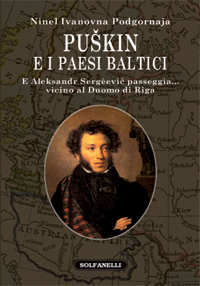 |
Ninel Ivanovna Podgornaja
Puškin and the Baltic Countries
(Solfanelli Editore- Chieti)
Italian version by
Alfredo Bertollo & Pier Luigi Coda |
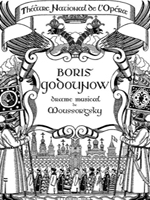
Playbill of Boris Godunov by Musòrgskij
|
Pushkin in Western Europe does not enjoy great popularity: rather recently in Italy is reminiscent of the conference organized in Milan in the second centenary of his birth 1999), but this important event has remained largely confined to scholars of Slavic studies and did not make substantial improvements to the spread the work of the poet. It is also interesting to note that much of the fame enjoyed by Pushkin in Italy is linked, in spite of himself, drawn from his literary works and set to music, among others, by Glinka, Mussorgsky, Rimsky-Korsakov and Pyotr Ilyich Tchaikovsky .
|
Curious and strange indeed if you think that in a letter to his friend Vyazemsky Pushkin says: "How could you write a libretto, subject the art of poetry to music? Not for Rossini would have lifted a finger." But you know, sometimes the pen to the writer gets out of hand and goes its own way, also happened to Jonathan Swift the "disgrace" not to bear children and become a classic for youth with his Gulliver's Travels.
|
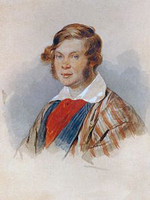
The friend Piotr Viàzemskij |
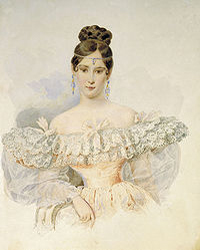
Natal’ja Nikolaevna Gončarova |
However, in recent decades, as well as numerous critical essays on Pushkin, several biographies have appeared, mainly in English but also in German, French and Italian.
It is not surprising, in Pushkin's life there are all the ingredients to manufacture a best seller: mysteries, uncertain origin, conspiracy, utopia, crazy love and betrayal, pimps, and courtesans, jealousy, duels, convictions and acquittals, particularly genius, art and fine poetry.
With "Pushkin and the Baltic countries", Podgornaja builds an original polyptych of fascinating reading, with faces and figures that excel on the historical and literary scene of Russia in the first half of the nineteenth century: the distracted Kjuchel'beker, the dreamer Del'vig, the militant Danzas, the generous Zhukovsky and others, including his beautiful wife Natalya Nikolaevna Goncharova, the final apotheosis of tragedy.
|
In the background: the epochal upheaval that has seen Russia in the period: from the Napoleonic invasion to the utopian dream of the Decembrist revolt foundered miserably in the tragic reality of the gallows and sentenced to hard labours in Siberia. In this context emerges the greatness of Pushkin, his poetic genius and his social commitment and stand out on the scene, despite years of confinement and by the stubborn mistrust of political power, are able to draw indelible marks on the pages of Literature and History.
|
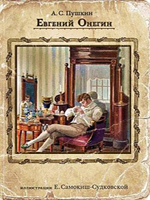
Original cover of Evgeni Onegin
|
Not surprisingly, the Podgornja recalls the prophetic verses written by Fyodor Glinka:
Oh Pushkin, Pushkin, who
Taught thee to fascinate with beautiful verses?
About inhabitants of the celestial
I love you, young man.
Do not be afraid of fate and time hoary
Fear not, young singer,
The footsteps of generations disappear
But you live, talent, genius, immortal!
|

